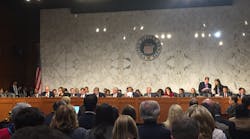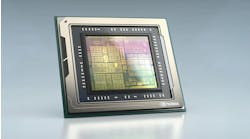Effort to include trucks fails before Senate panel advances autonomous bill
A Senate panel has excluded commercial trucks from legislation it approved on Oct. 4 to assist the development and deployment of autonomous cars.
Unanimous passage by the Senate Committee on Commerce, Science, and Transportation sends the AV Start Act (S. 1885) to the full Senate. Similar legislation that also excludes vehicles over 10,000 lbs. was passed by the House of Representatives last month.
“Today’s vote underscores the bipartisan desire to move ahead with self-driving vehicle technology,” said Sen. John Thune (R-SD), chairman of the committee and lead Republican sponsor of the bill. “The safety and economic benefits of self-driving vehicles are too critical to delay.”
Ahead of the hearing, Sen. James Inhofe of Oklahoma filed an amendment that would have included commercial trucks, but he was ultimately forced to withdraw the measure.
Sen. Todd Young on Indiana spoke out in favor of the amendment, saying “we’re really missing the boat.”
The legislation would allow automakers to sell thousands of autonomous vehicles, provided they demonstrate they are as safe as current vehicles with human controls.
The bill grants the National Highway Traffic Safety Administration authority to exempt vehicles from existing safety requirements, and the agency would have to make a determination within six months of getting a request.
States would still be charged with setting rules on licensing, insurance and safety inspections.
Prior to the hearing, all sides of the debate spoke out in support of their positions.
“It is simply inconceivable that this legislation would favor one type of vehicle over another, as both cars and trucks travel together every day on the same roads and bridges,” American Trucking Associations president and CEO Chris Spear wrote in a letter to Inhofe.
Meanwhile, Advocates for Highway and Auto Safety President Jackie Gillan raised safety concerns.
“The AV Start Act takes a dangerous hands-off approach to hands-free driving. It lacks adequate government oversight and industry accountability. There are warning signs already that this bill puts too much trust in the hands of automakers and places too little importance on consumer safety protections.”



